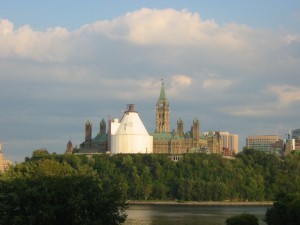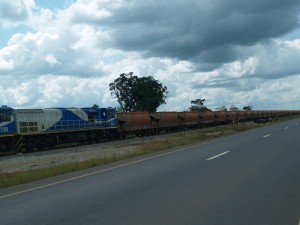BY: Joan Baxter

Former Senate Page, Brigette DePape in 2011
Canadian prime minister Stephen Harper is spending immense amounts of taxpayers’ money to promote himself, his government, the oil and gas industry, his neoconservative ideology and his neoliberal big-dog-devour-little-dog economic dogma – and this kind of propaganda machine does not bode well for Canada’s or any country’s democracy…
One of the very first things I noticed when, in the 1980s, I lived and travelled in some decidedly non-democratic countries in West and Central Africa, was the over-the-top narcissism of some of the dictators and their obsession with absolute control of their political messages, which were almost exclusively about themselves and what great leaders they were.
It was relentless. Their portraits and political propaganda were ubiquitous, filling billboards, plastered all over the front pages of newspapers, and even their most insignificant comings and goings monopolized radio and television newscasts (and caused massive traffic jams). There were no such things as genuine press conferences; rather there were staged events with fawning reporters recording the great leader’s every word while political partisans applauded.
As a young, impressionable Canadian woman who had come of age during the “just society” years in Canada, never experienced first-hand conflict or the political turmoil, excesses and human rights abuses that abound in the absence of democracy, I remember how terrifying it all seemed.
Fast forward to 2015.
Most of those African countries I lived in are now democracies, not perfect ones, but far more democratic than they were two or three decades ago. And while there is still a long way to go in many of these young democracies, at least most of the signs are pointing in the right direction.
Full speed backwards in Canada
Not so Canada, where we’ve been moving in the wrong direction, full speed backwards. Continue reading Canadians pay the high costs of Stephen Harper’s Conservative propaganda machine





 I wish I were writing to you under better circumstances, and not when you are at such a low point in your history, so badly abused by
I wish I were writing to you under better circumstances, and not when you are at such a low point in your history, so badly abused by 
 Not even 50 kilometres from the disputed land lease taken out by the Siva Group in Kpaka Chiefdom in Sierra Leone’s Pujehun District, where angry youth leaders and local chiefs are denouncing their Paramount Chief for signing away their precious farmland, there is similar discontent and dis-accord over a land deal in the Malen Chiefdom. There, Socfin Agricultural Company (SL) Ltd, or SAC, has leased 6,575 hectares and converted more than half of that into monoculture oil palm plantation. It is now seeking to lease and plant an additional 5,500 hectares, for a total of 12,000.
Not even 50 kilometres from the disputed land lease taken out by the Siva Group in Kpaka Chiefdom in Sierra Leone’s Pujehun District, where angry youth leaders and local chiefs are denouncing their Paramount Chief for signing away their precious farmland, there is similar discontent and dis-accord over a land deal in the Malen Chiefdom. There, Socfin Agricultural Company (SL) Ltd, or SAC, has leased 6,575 hectares and converted more than half of that into monoculture oil palm plantation. It is now seeking to lease and plant an additional 5,500 hectares, for a total of 12,000.


 So it was that in late 2009, Sierra Leone’s President Ernest Bai Koroma took the podium at the Sierra Leone Trade and Investment Forum at the Queen Elizabeth II Conference Centre in London, England. The country was still better known internationally for “blood diamonds” and a brutal civil war they fuelled, than for its impressive peace-building efforts in the ten years since the war ended. President Koroma wanted to change that.
So it was that in late 2009, Sierra Leone’s President Ernest Bai Koroma took the podium at the Sierra Leone Trade and Investment Forum at the Queen Elizabeth II Conference Centre in London, England. The country was still better known internationally for “blood diamonds” and a brutal civil war they fuelled, than for its impressive peace-building efforts in the ten years since the war ended. President Koroma wanted to change that.